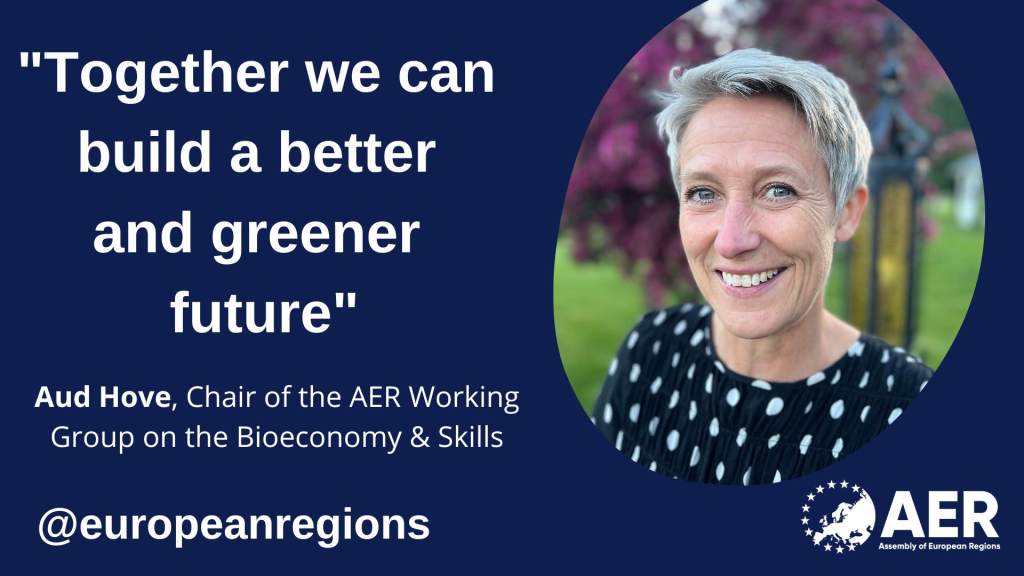 Share this!
Share this!How exchanging experiences with other regions leverages knowledge and the ability to create impact: the Chair of the newly created working group on the bioeconomy & skills, Aud Hove, Innlandet (NO), shares about her motivation for setting up a working group within the AER network.
Can you please introduce yourself?
My name is Aud Hove, I serve as the deputy county mayor in Innlandet county, Norway. I come from a small mountainous village and municipality, named Skjåk, but due to my occupation, I currently live in Lillehammer. I have always been interested in bio-based business and nature management.
In Norway we have a saying “from the earth to the table” not different from EU new initiative Farm to Fork, emphasizing that value chains must play together and do no significant harm to others or the environment.
Our region, Innlandet needs our farmers and we need the industry so that people get what they need for a living. At the same time, I also believe that we must change some of our habits and consumption. Norway, Europe, and the western world consume far more than we produce and it is not sustainable in the long run.
What motivated you in launching the working group on the bioeconomy & skills?
The bioeconomy is both the past and the future. We have always harvested from the wood and fields, but oil, gas and coal have taken up too much space in the last decade.
I’m convinced that collaboration, experience sharing, knowledge, and research and education it is the key to success.
Aud Hove, Chair of the AER Working Group on the Bioeconomy
The value chain in biomass and green carbon can be used more sustainably, wisely while we at the same time look for new products fit for green Innlandet and Europe.
I’m convinced that collaboration, experience sharing, knowledge, and research and education it is the key to success. Bioeconomy, and circular economy is not only necessary for a green transition, but also our green gold, our future livelihood.
What do you want to achieve with this working group?
Innlandet and Norway cannot solve global environmental challenges alone.
As emphasised in the Paris Agreement, the EU Green Deal, and the UN Sustainable Development Goals, international collaboration and solutions are needed. Sharing good examples and tackling common challenges across national borders is a part of Innlandet’s strategy.
We want to create a common understanding of different opportunities and challenges, by learning from others and sharing our best practices. Developing and improving the bioeconomy is part of the solution for climate and environment, and I think Innlandet has expertise and know-how which we can share with the rest of Europe.
What will the working group do in the coming months?
Our ambition is to create a community amongst European regions to share challenges, opportunities and maybe future partnerships and projects.
First we will facilitate a workshop on the occasion of the AER Summer Academy in Ireland with young people, where we will challenge the current situation and ask how the bioeconomy can become our green gold in a sustainable future. Indeed sustainability has three pillars: economic, social, and environmental. All three pillars must be weighted equally to get a fair distribution and a future in harmony. In an increasingly resource-scarce world, we want to lift and empower youths and young leaders, through our democratic institutions and build tolerance for each other’s needs. I think young people see this more clearly than previous generations.
Second, we are planning a meeting of the working group on the side of the AER General Assembly, during the European Week of Cities and regions, the second week of October 2022. This meeting will be focused on experience exchange.
In Spring 2023, we want to organise an online activity around project development.
Another activity we will carry out is the mapping of the specificities of each region and their good practices as a basis for matchmaking, study visits, potential projects
If this collaboration with other regions was a film, what would be the title?
“Together we can build a better and greener future”
Or: “Leapfrogging green bio-based transitions – A tale of European Regions”
